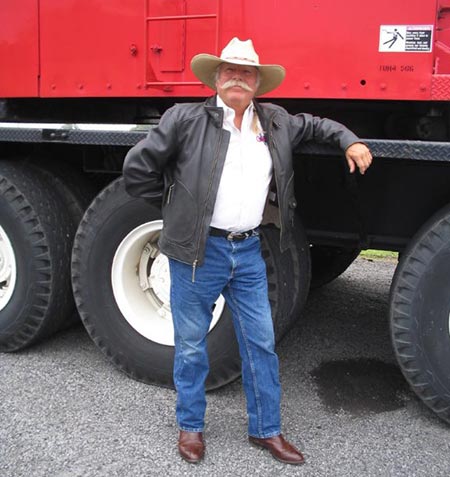Crane Inspector Profile: John Alexander
John Alexander may only have been a CCO-certified crane inspector since 2011, but he has over 47 years of experience in both operating and inspecting cranes. In fact, for many years, John inspected the cranes he operated since no third-party independent inspection entities were available in his area. It was only in 1996, after years of operating experience, that John started taking crane inspector training classes.

CCO Certified Crane Inspector, John Alexander: “An inspector who has gone through the process of becoming CCO-certified has not just passed a test and been given a piece of paper. Earning a CCO crane inspector certification that is accredited through ANSI is a major achievement that is recognized across the country.”
In the years following his certification as a mobile crane operator in 1999, John was appointed to the NCCCO Written Exam Management Committee as a subject-matter expert and joined the task force working on the new CCO Crane Inspector certification program. John was also co–task force chairman for the Overhead Crane Operator Certification program. He felt that there was a real need in the industry for crane inspectors to be better qualified. “To obtain CCO crane inspector certification, inspectors must have a level of knowledge and competence beyond that which would make them qualified per OSHA requirements,” he says.
John’s experience has shown him why crane inspectors in the field need to be better qualified and should be CCO-certified. Earlier in his career he was operating an 18 ton hydraulic truck crane that was inspected by an out-of-town, independent, third-party crane inspector. John was familiar with the truck’s overall condition and knew there were at least 20 deficiencies. When John received the inspection report back from the inspector, however, he was surprised to see that the only deficiency listed related to cracked glass. Experiences like these solidified John’s belief that a certification such as NCCCO’s was necessary for the industry to hold certified inspectors to a higher standard and level of competency. ”The need in the industry for better qualified crane inspectors has also grown exponentially due to the OSHA 1926 regulations rewrite and numerous front-page catastrophes,” he says.
John also believes that his operator seat time and his CCO crane operator certification has made a huge difference in his current abilities as a crane inspector. “In some scenarios as an inspector you must be able to operate cranes,” he notes. Another aspect of the CCO Crane Inspector certification that gives it more teeth than other qualification and/or certification programs is its experience requirement. “Having years of seat time as a crane operator provides you with invaluable real-life experiences that can help you better inspect cranes,” he says.
Even though John currently inspects mostly mobile and overhead cranes in the general commercial construction and public utilities industries across the country, he spent 12 years of his early career as a tower crane operator. After taking a few inspector-related training classes in the late ’90s and becoming more comfortable with performing inspections on his own, John started out inspecting smaller hydraulic boom truck cranes. “There is a Manitex boom truck factory located close to our town, so there were many of these machines locally that needed to be inspected,” he recalls. John remembers the first time he performed a lattice boom truck crane inspection. “It was a 50 ton Link-Belt lattice boom crane that did not have a previous annual inspection report. I systematically followed my inspection checklist, and after I completed that inspection each crane thereafter was easier to inspect.”
Another benefit of becoming a CCO-certified crane inspector is the “confidence that is gained through going through the certification process,” John says. “An inspector who has gone through the process of becoming CCO-certified has not just passed a test and been given a piece of paper that states he is qualified. Earning a CCO crane inspector certification that is accredited through ANSI is a major achievement that is recognized across the country.”
That type of confidence and industry respect has helped John through some of his most interesting and challenging inspections. He has inspected cranes ranging from a 1,500 ton barge-mounted ringer crane to a 2800CC Terex with 400 ft. of total boom length. The machine performed with no issues and passed the inspection, although the complete crane inspection took two days to complete. The previous inspector took two hours to inspect the same crane.
Inspection by a CCO-certified crane inspector is a good indicator of a thorough inspection. John states that one of the most important questions he asks his crane owners during an inspection is, “How was your last inspection?” The answer to this question can expose what the previous inspection entailed, as well as the quality of the last inspection. John believes that the CCO crane inspector certification really emphasizes how important it is for a candidate to keep up to date on his knowledge of standards, OSHA directives, and a thorough recognition and understanding of components.
In addition to being a CCO-certified crane inspector and operator, John also participates in accident investigation, safety consulting, and expert witness testimony. Crane inspections make up approximately 75 percent of his current business activities.
When John isn’t working or inspecting cranes he enjoys splitting his time between his ranch in central Texas and beach house on South Padre Island.